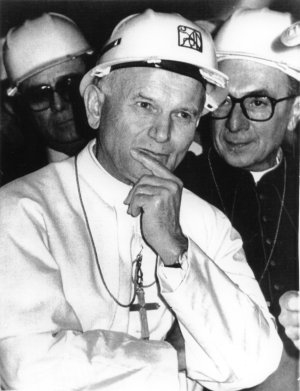Ed Karrens: 1983 saw the lifting of martial law in Poland and the awarding of the Nobel Peace Prize to Lech Walesa, leader of the outlawed Solidarity Labor Movement.
It was also the year Pope John Paul II made an historic visit to his native land and was welcomed by millions of cheering Poles. Poland was not the only country visited by the Pope during the past year. He also travelled to Lourdes, France, to Austria and, against the advice of many, to Central America. Because of the potentially dangerous situation in El Salvador and Nicaragua, there was concern for his safety; but Pope John Paul delivered his message of peace and completed his eight-nation journey without mishap.
The Pope's visit to Central America brought hope and comfort to millions, but failed to end the strife in that part of world. Michael Drudge reports from San Salvador …
Michael Drudge: "In El Salvador, there remains no end in sight to the four-year-old civil war. As Christmas neared, leftist guerillas had regained momentum after a year in which the demoralized army dumped a Defense Minister, launched a new offensive and then lost its punch in an apparent leadership crisis that sparked rumors of a coupe. Right-wing death squads took advantage of the turmoil, prompting its third warning from the United States that aid could be cut.
"This is Michael Drudge in San Salvador."
Jenny Cossola: In 1983, an event took place in the Philippines that plunged that country into turmoil. On August 21st, a 50-year-old politician named Benigno Aquino was gunned down and killed at the Manila International Airport. Aquino, who had opposed the regime of President Ferdinand Marcos for all 17 years of its existence, was shot within minutes of his return to his native country after three years of self-imposed exile.
Marcos expressed shock at the murder and said his Government had no involvement in it. Millions of Filipinos apparently felt otherwise and staged massive demonstrations calling for Marcos' resignation.
There were demonstrations of a quite different kind in other parts of the world. Concern over the threat of a nuclear war prompted worldwide anti-nuclear protests.
Jim Colizar reports some of the biggest were held in major cities across Western Europe and at U.S. military bases in West Germany and Great Britain …
Jim Colizar: "The focus of this new protest was the stationing in Western Europe of new U.S. nuclear missiles. NATO had decided to deploy the Cruise and Pershing II missiles unless an agreement was reached at the Geneva Arms Talk. As the year progressed, it became clear that no agreement was likely before the deployment date. The Soviets threatened to walk out of the talks if any of the missiles arrived.
(00:20:00)
Jim Colizar: "Cruise missiles are scheduled to touch down first at Greenham Common Air Base west of London. For more than two years women protesters had camped out there to try to prevent the Cruise deployment. But they could only stand and watch when U.S. Air Force jets landed with the missiles on board. The women claimed they were not disappointed … "
Unknown Speaker: "'Certainly not.'"
Unknown Speaker: "'Nooo (laughing).'"
Unknown Speaker: "'They got them in by air because we're here, and that's the only way they're going to get them out.'"
Jim Colizar: "That night, one of them led a candlelight protest … "
Unknown Speaker: "'Candles always a symbol of peace and as hope, too, because we haven't given up. This is just the beginning of the next stage in our campaign against nuclear weapons, and those candles stand for the hope we have, 'cause in fact they will be dismantled and they will be taken away.'"
Jim Colizar: "In Geneva, the Soviets made good on their threat. They walked out and vowed to deploy new missiles themselves in Eastern Europe and other missiles aboard submarines that they would threaten U.S. territory.
"Jim Colizar, London."
(Music.)
Jenny Cossola: You're listening to 1983 in Review. We'll be back with more of the year's top stories in just a moment.











